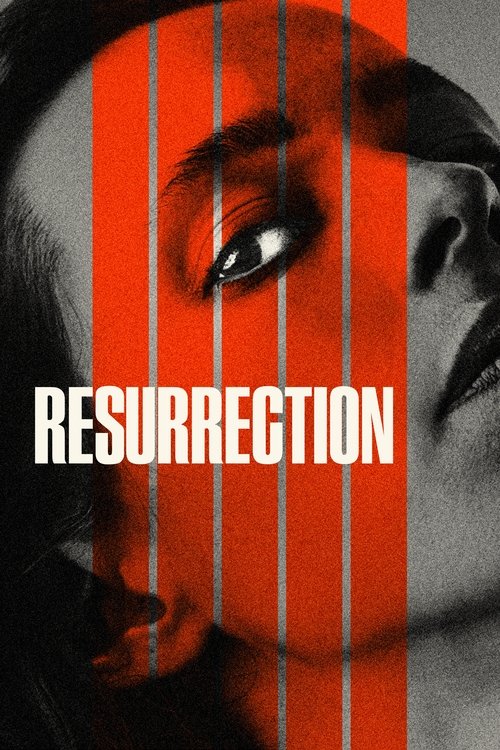
 Resurrection
— Maintain control.
Resurrection
— Maintain control.
Resurrection

A woman's carefully constructed life is upended when an unwelcome shadow from her past returns, forcing her to confront the monster she's evaded for two decades.

 Resurrection
— Maintain control.
Resurrection
— Maintain control.

A woman's carefully constructed life is upended when an unwelcome shadow from her past returns, forcing her to confront the monster she's evaded for two decades.
The director folds the story into two sides, the psychological and the physical, and uses the representation of physicality to make us doubt the character's madness, to draw a fine line between what is supposedly real and what is supposedly imagined. The camera approaches and encloses Margaret. Splendid Rebecca Hall in the representation of motherhood as a state of constant insecurity, a permanent terrifying fear.
Deeply bizarre and sad. The narrative explores heavy themes such as abuse, trauma and manipulation in an intense and limitless way. Rebecca Hall's performance is remarkable; her dedication to the character is impressive, generating striking and disturbing scenes that create a heavy atmosphere throughout the film.
An absolutely stellar performance by Rebecca Hall. Every scene builds tension and atmosphere. Margaret’s monologue pulls you in close and makes clear why she remains so emotionally detached from others, excluding her daughter.
"A sadist never understands why others aren't enjoying his sadism as much as he is"
These sorts of psychological thrillers are completely my bag, so I think I took this more favourably than the other reviews on this site and around the web. Resurrection tells a story of Maggie, a woman who seems to have her life together before she becomes completely wrought with trauma from a distant past relationship. When the man that instilled this trauma upon her reappears after 22 years, Maggie's safe, stable life is upended as she attempts to deal with the reintroduction of this source of endless pain and trauma.
Resurrection really hammers home the damage that a past trauma can bring to someone, even decades after the fact when they've seemingly processed that portion of their life. New relationships are destroyed before they can even take shape, family bonds are broken due to the strain, and the ability to function "normally" is thrown into disarray. Rebecca Hall really gives her all in this performance and it shouldn't go unnoticed due to the "horror" banner that this film will assuredly fly. There is one monologue that is showstopping, and I imagine will become a new audition piece for many aspiring actors.
While many seem to bemoan the lack of concrete answers, Resurrections dream-like, surrealist portrayal only aids the intricate feeling and emotion that it's trying to evoke and convey. Having no final answer gives us the chance to ponder and muse on what it all means, and has seemingly led me to writing this glowing appraisal.
If you're a fan of the new wave of surreal, psychological horrors with a contemporary twist, you can't go wrong with Resurrection. Prepare for a slow burn and let everything wash over you and I promise the post movie debrief will be worth it as you dissect and ponder everything you've just seen. Very good movie, and one that I'll be thinking about for the rest of the day.
Rebecca Hall is one of the greatest actors working today and I don't think enough people realize that
This is disturbing in the most effective and impactful way. It's hard to watch, and it should be. I kept waiting for things to turn around, but soon realized that maybe that isn't the point of the movie. I especially appreciate how layered the portrayal of trauma and toxicity is.
For those confused about the ending
With the exception of the ending I think everything was real. We can see the impact that David had on Margaret’s life. Due to him completely ruining her trust with men it means that she’s having sex with a married man. That makes him off limits as far as relationships go. It’s also why when Abbie invites him over for an intervention that she’s so pissed. Because it’s just supposed to be about sex and nothing more. The same goes for when he tells her that he loves her. We also see this when David asks Margaret who the father of Abbie is. She says that she just had sex with random men, so she doesn’t know who it is. She did that so that she could have a child and the father wouldn’t be involved in their life so that she wouldn’t have to experience what happened with David and their son again.
David obviously never ate Ben. He killed him and and then buried or put him elsewhere as part of the abuse. In the same way that some people will try to have a baby in order to keep their partner around, he decided to kill the child and convince Margaret that he ate him and that he’s still alive inside. It’s obviously insane, but you have to remember that when Margaret told Gwyn about their relationship that she mentioned that she believed everything he said. So for as unbelievable as that is, she still believed it because of how successful he was at manipulating and grooming her from a relatively young age.
The end I believe is her breaking out of the delusion that she went into after killing David. We already know that Abbie moved out their apartment, so it makes no sense for her to be packing up. And Ben has obviously long been dead. So we get that zoom in on her where everything looks perfect. Except it keeps zooming closer and closer revealing all the flaws on her face. It’s her delusion slowly breaking.
It was a quite unnerving movie and the ending was kind of bonkers.
A very tense, stressful and unsettling psychological drama thriller. It's very very slow and no action until the last 15 minutes. I didn't like the ending it gives more questions than answers but I think it's worth the watch for Rebecca Hall who gives the performance of her career! That 8 minute monologue was out of this world that's the kind of performance people study - what the hell?!
The director folds the story into two sides, the psychological and the physical, and uses the representation of physicality to make us doubt the character's madness, to draw a fine line between what is supposedly real and what is supposedly imagined. The camera approaches and encloses Margaret. Splendid Rebecca Hall in the representation of motherhood as a state of constant insecurity, a permanent terrifying fear.